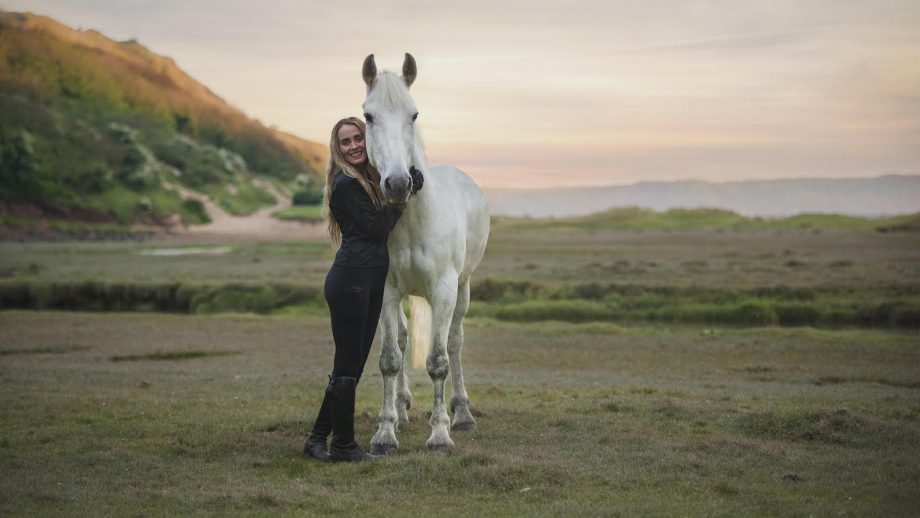A rider is urging others not to dismiss signs their horses might be having problems urinating after discovering her gelding’s penis was covered in “huge masses” of melanomas.
Lowri Caswell, 22, has known her 17-year-old Irish draught Dennis for four or five years but in 2020 he became hers when she was given him by a close friend.
“I began riding him for his old owner, Elaine Owen, and competing him across the country in one-day events, showing, dressage, side-saddle, clinics, you name it — he’s a once in a lifetime horse who has done it all and he’s my best friend,” Lowri told H&H.
“We won many events and even just out hacking, galloping through fields, he is everybody’s dream horse. He’s a bit of a legend in Gower, where we live.”
In January this year Lowri’s mum noticed Dennis was urinating slightly oddly and then realised they had never seen him drop his penis.
They kept an eye on him and one day when he did drop it, Lowri’s mum “caught a glimpse of what looked like a mass”.
“We’re experienced horse owners, horses have been in our family for decades and we spoil our horses as they are our pets, they have a five-star life, but it was something we’d never noticed with him,” Lowri said.
“We casually thought it was a bean which needed removing, as most geldings need, but my mum wanted to be absolutely sure, so we booked in with the vets to have it all checked out.”

When Dennis, who is a grey, was sedated and examined, huge masses of melanomas were discovered.
“t was only a matter of time before those huge growths would have ulcerated and he would have had to be put down. We were distraught, as he truly is the most special horse I think I will ever own in my lifetime,” Lowri said.
“We blamed ourselves for not checking sooner, but we weren’t to know as they were not visible and only by absolute luck did my mum spot them on the one occasion he dropped his penis in five-plus years.”
Vet Richard Coomer, a director at Cotts Equine, advised that the only option was radical, three-hour surgery to remove Dennis’s sheath and penis and redirect his urethra to just below his anus, so he would urinate backwards like a mare.
“We cried for days beforehand and due to Covid, we couldn’t even go in to the vets and check he was all ok. We just had to have complete trust and faith in the professionals,” Lowri said.
The surgery was a success and Dennis spent a month on box rest, being walked for 10-15 minutes four or five times a day, with daily turnout to reduce the swelling.
“We had two emergency vet callouts, where we thought we were going to lose him, as he was displaying colic symptoms, we think was due to the amount of medication he was on,” Lowri said. “It was a very stressful two months.”
Dennis was given the all-clear to resume walking under saddle in May and he is learning to adapt to his new way of urinating.
“He still wees on his tail and legs as he hasn’t quite mastered it but we are hoping this will come with time,” Lowri added.
Lowri said she had been surprised when the vets told her that the operation was not uncommon, as she had struggled to find information when she tried to research the procedure.
“If we had known about the severity of melanomas in greys, perhaps we would have pushed for the vets to check him sooner when he first came to us and displayed signs of discomfort, rather than passing it off as his personality,” Lowri said. “Most experienced horse owners are aware that greys are more susceptible to melanomas, but owners of greys should consider checking in places that are less visible.
“I feel it is a bit of a taboo subject, which should be spoken about more freely and would’ve given us more confidence and knowledge in making this decision.”
Richard, who operated on Dennis, told H&H that while it is still a “comparatively rare surgery”, he had performed the procedure several times.
“In the textbooks, it’s most commonly indicated for squamous cell carcinomas, which tend to occur in older horses. Because that is relatively rare, in my experience its usually melanomas that cause us to operate,” he said. “It tends to affect relatively younger, fitter horses who have plenty of life left, which makes it a much simpler decision.”
Richard said that complications are rare and horses are usually able to urinate straight after surgery.
“If it were a human being, they’d know what to expect but for a gelding, they wake up from anaesthesia and they’re suddenly weeing out of the back. Dennis was one of those who looked terribly surprised when it happened,” he said.
He noted that while other colours of horse did suffer from melanomas, most of his surgeries have been on greys.
Most of his patients have also seemed more comfortable once the masses had been removed.
“Judging that sort of low-grade pain in horses quite subjective but a lot of them seem happier and brighter, which suggests that while in theory melanomas are benign, they are a bit painful,” he added.
You might also be interested in:

‘I’ve got my boy back’: sheath bean removal transforms horse’s life
The thoroughbred had been out of work for four years before the bean was removed

Horse loses sheath and part of penis after major melanomas found during sheath clean
“He’s so much more than just a horse; he’s everything I work towards and my best friend”

Rescued cob who ‘died’ for 45 minutes survives cancer and losing sight in one eye to return to work
“He has such a lovely life,” she said. “But if I hadn’t washed his willy that time, he’d be dead

Angus the psychic horse predicts England will win Euro 2020 football final

Subscribe to Horse & Hound magazine today – and enjoy unlimited website access all year round
Horse & Hound magazine, out every Thursday, is packed with all the latest news and reports, as well as interviews, specials, nostalgia, vet and training advice. Find how you can enjoy the magazine delivered to your door every week, plus options to upgrade your subscription to access our online service that brings you breaking news and reports as well as other benefits.




